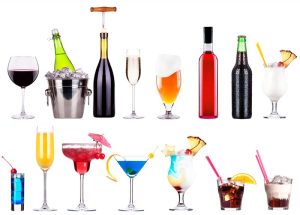As the holiday season approaches, bringing with it a whirlwind of festivities and cheer, it’s important to navigate this joyful time  with an eye towards safety and responsibility.
with an eye towards safety and responsibility.
As personal injury lawyers, we’ve seen the unfortunate (and sometimes tragic) aftermath that can arise during this season due to drinking and driving.
Seasonable beverages, rich in both flavor and alcohol content, can sneak up on even the most cautious individuals, making the role of a designated driver more crucial than ever.
The decision to appoint a designated driver should be made well before the first toast is raised.
Designating a completely sober driver ensures a safe journey home and reflects a deeper understanding of the responsibilities that come with holiday celebrations.
The spirit of the holidays, while uplifting, can sometimes lead to relaxed attitudes towards alcohol consumption, especially at gatherings where potent holiday drinks are served – Kevin Jones, NC Accident Lawyer
Awareness of the heightened risks during this season, the potential impact of deceptively strong holiday drinks, and the importance of planning for a safe way home are key to ensuring that the festive period is remembered for its joy and not for regrettable incidents.
As you indulge in the season’s festivities, keep these thoughts in mind to help ensure that your celebrations are not only merry but also safe and secure.
What you need to know about DUI in North Carolina
North Carolina’s DWI (driving while impaired) statutes are designed with a comprehensive approach to discourage and penalize impaired driving, with a focus on public safety.
DWI laws are not limited strictly to the act of “drunk driving” in the traditional sense; rather, they encompass a broader definition of impairment.
A driver can be charged with DWI even if they are not exhibiting the classic signs of drunkenness or if their blood alcohol concentration (BAC) is below the legal limit of 0.08 – Kevin Jones, Car Accident Lawyer in North Carolina
North Carolina’s impaired driving law is grounded in the concept of “appreciable impairment,” not necessarily drunk driving.
Essentially, if a driver is found to have their physical or mental faculties impaired by alcohol or other substances to an extent that is noticeable or perceptible or “appreciable,” they can be charged with DWI.
This includes impairment from prescription medications or illegal drugs, not just alcohol. 
This broader definition is crucial in addressing how impairment affects driving abilities.
Moreover, North Carolina law also allows for a conviction with a BAC of 0.08 or higher, regardless of their actual physical or mental state.
This is often referred to as “per se” impairment.
For commercial drivers, the BAC threshold is even lower, set at 0.04, reflecting the higher responsibility placed on professional drivers.
Additionally, drivers under the age of 21 are subject to a zero-tolerance policy, meaning any amount of alcohol in their system is grounds for a possible conviction under N.C.G.S. 20-138.3 which is entitled: Driving by person less than 21 years old after consuming alcohol or drugs.
The penalties for DWI in North Carolina can be severe and vary depending on the specific circumstances of the offense and the individual’s prior driving record.
They can range from fines and license suspension to jail time in certain circumstances.
North Carolina’s DWI laws are enforced through various means, including roadside sobriety tests and breathalyzer tests.
Refusal to submit to a breathalyzer test can result in immediate license revocation, based on the state’s implied consent law.
This law states that by driving on North Carolina roads, drivers have implicitly consented to submit to chemical tests if suspected of DWI.
The intent behind these stringent laws is to deter individuals from driving while impaired and to reduce the number of alcohol and drug-related accidents on the roads.
Understanding these laws is crucial, as it underscores the importance of making responsible choices when it comes to consuming alcohol or other substances and then deciding to drive.
The key takeaway is that in North Carolina, impaired driving encompasses a wide range of scenarios beyond just traditional drunk driving, highlighting the need for constant vigilance and responsible behavior behind the wheel.
Punitive Damages and Drunk Driving
Punitive damages in North Carolina serve a specific and critical role in the realm of personal injury law, particularly in cases involving impaired driving.
These damages are not just about compensating the victim; they are designed to punish the wrongdoer for particularly egregious conduct and to deter similar behavior in others.
When an impaired driver causes an accident resulting in injury, the law recognizes this as not just a mere lapse in judgment but as a serious breach of societal safety norms.
As personal injury lawyers dedicated to helping those wrongfully injured due to the negligence of other drivers, we very much understand punitive damages can be an important aspect of obtaining true justice – Kevin Jones, Drunk Driving Accident Lawyer
Punitive damages go beyond the usual compensatory damages that cover medical expenses, lost wages, and pain and suffering.
They may, in appropriate circumstances, be imposed to send a clear message that society condemns reckless and dangerous actions, like driving under the influence of alcohol or drugs.
In North Carolina, when a driver chooses to get behind the wheel while impaired, they not only risk their own life but also the lives of everyone else on the road.
This reckless decision, when it results in an accident causing harm, is exactly the kind of behavior that punitive damages are meant to address.
The imposition of punitive damages serves a dual purpose.
Firstly, it aims to provide some measure of justice to the victims who have suffered due to the irresponsible actions of the impaired driver.
Secondly, and perhaps more importantly, it acts as a deterrent, signaling to the community at large that driving while impaired is a serious offense with severe consequences.
In the context of personal injury law, punitive damages are a reflection of a societal commitment to uphold safety and responsibility on the roads.
They underscore the principle that individuals who choose to endanger others through particularly dangerous behavior, like impaired driving, should be held accountable not just for the harm they cause but also for the recklessness of their actions.
Helpful Information: NC Accident Lawyers
FAQs and Answers about your legal rights after an accident
Drunk Driving Accident Lawyers in Greenville NC
NC Contributory Negligence and Your Accident Claim
Accidents in Coastal North Carolina: A Comprehensive Guide for Visitors
Wrongful Death Claims in North Carolina – What You Need to Know
 North Carolina Workers' Compensation News
North Carolina Workers' Compensation News








